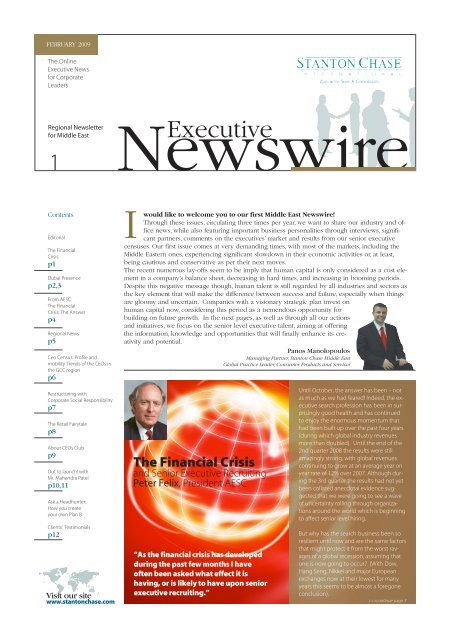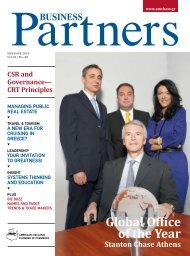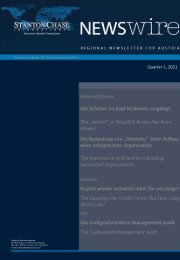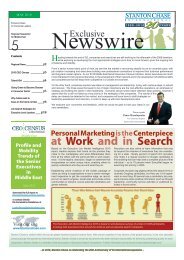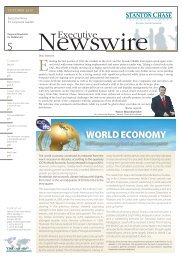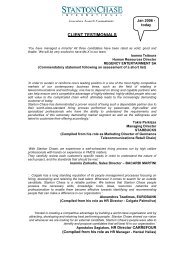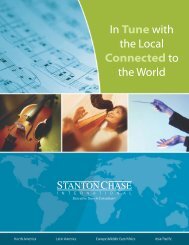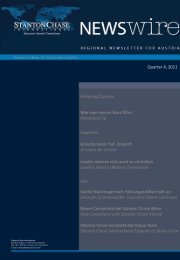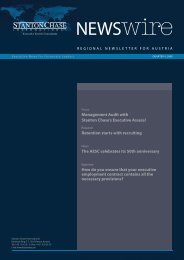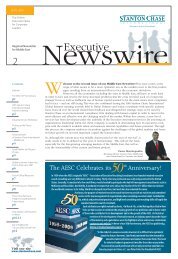The Financial Crisis - Stanton Chase International
The Financial Crisis - Stanton Chase International
The Financial Crisis - Stanton Chase International
Create successful ePaper yourself
Turn your PDF publications into a flip-book with our unique Google optimized e-Paper software.
FEBRUARY 2009<br />
<strong>The</strong> Online<br />
Executive News<br />
for Corporate<br />
Leaders<br />
Regional Newsletter<br />
for Middle East<br />
1<br />
Editorial<br />
<strong>The</strong> <strong>Financial</strong><br />
<strong>Crisis</strong><br />
p1<br />
Dubai Presence<br />
p2,3<br />
From AESC<br />
<strong>The</strong> <strong>Financial</strong><br />
<strong>Crisis</strong>: <strong>The</strong> Answer<br />
p4<br />
Regional News<br />
p5<br />
Ceo Census: Profile and<br />
mobility Trends of the CEOs in<br />
the GCC region<br />
p6<br />
Restructuring with<br />
Corporate Social Responsibility<br />
p7<br />
<strong>The</strong> Retail Fairytale<br />
p8<br />
About CEOs Club<br />
p9<br />
Out to launch! with<br />
Mr. Mahendra Patel<br />
p10,11<br />
Ask a Headhunter:<br />
How you create<br />
your own Plan B<br />
Clients’ Testimonials<br />
p12<br />
Newswire<br />
Executive<br />
I fice news, while also featuring important business personalities through interviews, significant<br />
partners, comments on the executives’ market and results from our senior executive<br />
censuses. Our first issue comes at very demanding times, with most of the markets, including the<br />
Middle Eastern ones, experiencing significant slowdown in their economic activities or, at least,<br />
being cautious and conservative as per their next moves.<br />
<strong>The</strong> recent numerous lay-offs seem to be imply that human capital is only considered as a cost element<br />
in a company’s balance sheet, decreasing in hard times, and increasing in booming periods.<br />
Despite this negative message though, human talent is still regarded by all industries and sectors as<br />
the key element that will make the difference between success and failure, especially when things<br />
are gloomy and uncertain. Companies with a visionary strategic plan invest on<br />
human capital now, considering this period as a tremendous opportunity for<br />
building on future growth. In the next pages, as well as through all our actions<br />
and initiatives, we focus on the senior level executive talent, aiming at offering<br />
the information, knowledge and opportunities that will finally enhance its creativity<br />
and potential.<br />
Panos Manolopoulos<br />
Managing Partner, <strong>Stanton</strong> <strong>Chase</strong> Middle East<br />
Global Practice Leader, Consumer Products and Services<br />
Contents would like to welcome you to our first Middle East Newswire!<br />
Through these issues, circulating three times per year, we want to share our industry and of-<br />
Visit our site<br />
www.stantonchase.com<br />
<strong>The</strong> <strong>Financial</strong> <strong>Crisis</strong><br />
and Senior Executive Recruiting<br />
Peter Felix, President AESC<br />
“As the financial crisis has developed<br />
during the past few months I have<br />
often been asked what effect it is<br />
having, or is likely to have upon senior<br />
executive recruiting.”<br />
Until October, the answer has been – not<br />
as much as we had feared! Indeed, the executive<br />
search profession has been in surprisingly<br />
good health and has continued<br />
to enjoy the enormous momentum that<br />
had been built up over the past four years<br />
(during which global industry revenues<br />
more than doubled). Until the end of the<br />
2nd quarter 2008 the results were still<br />
amazingly strong, with global revenues<br />
continuing to grow at an average year on<br />
year rate of 12% over 2007. Although during<br />
the 3rd quarter the results had not yet<br />
been collated anecdotal evidence suggested<br />
that we were going to see a wave<br />
of uncertainty rolling through organizations<br />
around the world which is beginning<br />
to affect senior level hiring.<br />
But why has the search business been so<br />
resilient until now and are the same factors<br />
that might protect it from the worst ravages<br />
of a global recession, assuming that<br />
one is now going to occur? (With Dow,<br />
Hang Seng, Nikkei and major European<br />
exchanges now at their lowest for many<br />
years this seems to be almost a foregone<br />
conclusion).<br />
>>>continue page 3
FEBRUARY 2009 T h e O n l i n e E x e c u t i v e N e w s f o r C o r p o r a t e L e a d e r s<br />
p2<br />
Dubai presence<br />
Established in 2006, <strong>Stanton</strong> <strong>Chase</strong> in Dubai is strategically positioned to serve<br />
the growing demand for global talent across the Middle East region.<br />
Executive<br />
Newswire<br />
Although still a new office, <strong>Stanton</strong> <strong>Chase</strong> Dubai has achieved a significant growth, both in sales as well as in its consultants and researchers.<br />
Currently consisting of 12 people, our office has developed significant know-how and expertise on business sectors like the <strong>Financial</strong> sector,<br />
the Industrial sector (including Oil & Gas and Logistics & Transportation), Consumer Products and Services,<br />
Life Sciences & Healthcare and Technology.<br />
Besides the local market of the U.A.E. with emphasis so far on Dubai, our office has already developed significant partnerships and business<br />
opportunities in the Kingdom of Saudi Arabia, Qatar, Bahrain and Oman. <strong>The</strong> market of Abu Dhabi along with the rest of the GCC countries<br />
represent the main target for 2009; our team is already working hard in learning and understanding the culture and the market rules in all the<br />
above countries, enhancing brand awareness for <strong>Stanton</strong> <strong>Chase</strong> <strong>International</strong> and educating this diversified and demanding market on<br />
qualitative executive search consultancy services. <strong>Stanton</strong> <strong>Chase</strong> Dubai is member of the Dubai Chamber of Commerce and Industry, the<br />
American Business Council, the French Business Council, the Canadian Business Council, the CEO Clubs and the Luxury Marketing Council.<br />
Our marketing activities include the recent completion of our first CEO Census in the GCC region, a few business breakfasts, active participation<br />
as key note speakers, moderators or panelists in several international forums organized in this geographic area and a series of articles and<br />
interviews published in prominent English newspapers and magazines.<br />
Panos Manolopoulos<br />
Managing Partner,<br />
Global Practice Leader in Consumer<br />
Products and Services<br />
Panos Manolopoulos is the Managing Partner of the<br />
Middle East operations of <strong>Stanton</strong> <strong>Chase</strong>. He has been<br />
a member of <strong>Stanton</strong> <strong>Chase</strong> since 2004 when he<br />
started as General Manager of the Bucharest office<br />
and became Managing Partner of in 2005. Panos has an extensive<br />
background and expertise in the Consumer Products and Professional<br />
Services industries. He also acts as the Global Practice Leader in the<br />
Consumer Products and Services sector. He holds a Bachelor’s degree<br />
in Politics and <strong>International</strong> Relations (American University of Athens),<br />
a Master’s degree in Diplomacy -University of Lancaster- and Ph.D specializing<br />
in <strong>International</strong> Law and Relations.<br />
>p.manolopoulos@stantonchase.com<br />
United Arab Emirates<br />
Georgia Kartsanis<br />
EVP<br />
Dubai<br />
Georgia joined <strong>Stanton</strong> <strong>Chase</strong> as a Managing Partner<br />
and co-founder of the Athens office in 2001 and<br />
the Dubai office in 2006. From her long international<br />
career, she gained expertise in multiple industries<br />
and markets, strategic thinking and the ability to understand a client<br />
company's culture and management structure before delivering appropriate<br />
counsel. She has built a strong industry network, having accumulated<br />
ten years of senior commercial experience in the Consumer<br />
Products market with 3M and Philip Morris, six years of experience in<br />
the Industrial sector with Kendall Co. in the USA and seven years<br />
Technology expertise with Chomerics (a W.R Grace co.), KPMG and<br />
Response. She holds MSc and BSc degrees in Chemical Engineering<br />
from Lowell University, Massachusetts, USA.<br />
>g.kartsanis@stantonchase.com
Wassim Karkabi<br />
Partner & Regional Practice<br />
Leader, Industrial<br />
Wassim has successfully completed<br />
senior assignments in the<br />
Middle East and more specifically<br />
in the Gulf countries since 1997<br />
whilst with an Executive Search firm in Lebanon,<br />
in which he was a Partner. He has served leading<br />
multinational and regional holding companies as<br />
well as local companies. He has worked closely<br />
with and completed assignments for clients in a<br />
variety of Industrial Sub Sectors such as Real Estate<br />
Development, Facilities Management, Construction<br />
Management, Contracting, Plastics, Cable, Motors<br />
& Automation, Power Generation, and Power Transmission<br />
& Distribution. Wassim has also successfully<br />
completed numerous assignments in Logistics &<br />
Transport as well as Consumer Products & Services.<br />
>w.karkabi@stantonchase.com<br />
Gail Seuren<br />
Consultant, Consumer<br />
Products & Services Practice<br />
Active in Executive Search and<br />
Human Resources development<br />
since 1997, Guenaelle (Gail) started<br />
her executive search career with<br />
Nicholson <strong>International</strong> in Dubai, where she successfully<br />
managed a multitude of search assignments<br />
for leading multinational and local companies across<br />
the Gulf, covering positions from middle to senior<br />
management. Having owned her own company and<br />
provided Human Resources consulting projects to<br />
local and international organizations, Gail is attuned<br />
to the multicultural needs of organizations and people<br />
in the Middle East and has a thorough understanding<br />
of diverse company cultures and structures.<br />
>g.seuren@stantonchase.com<br />
S T A N T O N C H A S E I N T E R N A T I O N A L<br />
Gary Thompson<br />
Partner & Regional Practice Leader,<br />
<strong>Financial</strong> Services - EMEA<br />
Gary enjoyed a highly successful<br />
career in Investment Banking and<br />
Debt Capital Markets over two<br />
decades with such institutions<br />
as Citibank and CIBC before entering the Executive<br />
Search arena in 1989. Since that time Gary has specialized<br />
in financial sector recruitment acting on behalf<br />
of some of the world’s most prestigious banks,<br />
investment banks and insurance companies.<br />
Many of the roles for which his services were retained<br />
were very senior including CEOs, Global and Group<br />
Head roles, or very specialized positions involving<br />
highly technical skills in such diverse fields as derivatives,<br />
risk management and compliance.<br />
>g.thompson@stantonchase.com<br />
Caroline Foote<br />
Consultant, <strong>Financial</strong> Services<br />
Caroline is a Consultant, specialised<br />
in the <strong>Financial</strong> Services Practice.<br />
She has been with the <strong>Stanton</strong><br />
<strong>Chase</strong> Dubai Office since its foundation<br />
in 2006, and held the positions of Research<br />
Manager and Director of Research, accountable for<br />
the whole research operation, before being appointed<br />
as a Consultant. She moved to Dubai in 2005,<br />
and has conducted assignments for <strong>Financial</strong> Services<br />
clients across the Middle East and globally in private<br />
equity and venture capital, as well as corporate, investment<br />
and retail banking. Whilst in South Africa<br />
she also worked with clients in the Insurance Sector.<br />
Caroline has been involved in the Executive Search<br />
Profession since 1989 when she joined one of South<br />
Africa's premier search firms.<br />
>c.foote@stantonchase.com<br />
Nicolas Dietz<br />
Principal Consultant, Kingdom<br />
of Saudi Arabia<br />
ISSUE 1<br />
Nicolas Dietz first worked in the<br />
Middle East in 1985, and mainly<br />
with multinational organizations<br />
based in the Kingdom of Saudi<br />
Arabia, Egypt and the United Arab Emirates. Before<br />
joining <strong>Stanton</strong> <strong>Chase</strong> as Principal Consultant responsible<br />
for the Kingdom of Saudi Arabia, Nicolas worked<br />
for companies such as SAMBA, Air France, Mars,<br />
in addition to 14 years with Phillip Morris <strong>International</strong><br />
with whom he was last posted in the UAE as head<br />
of sales for the Middle East region. Nicolas specializes<br />
in the Consumer Products & Services practice group<br />
from his 16 years joint experience in management<br />
positions with Mars & Philip Morris <strong>International</strong>.<br />
He has also served in key roles in the Lausanne<br />
Headquarters of Phillip Morris where he was a core<br />
member of the Acquisitions Team and led Special<br />
Projects. Due to his functional experience, he also<br />
serves on the Logistics & Transport as well as the<br />
Professional Services practice groups within <strong>Stanton</strong><br />
<strong>Chase</strong> <strong>International</strong>.<br />
>n.dietz@stantonchase.com<br />
Pascal Baz<br />
Associate Consultant<br />
Pascal is an Associate Consultant<br />
specialized in the Industrial, Logistics<br />
& Transport, and Natural<br />
Resources & Energy sectors.She<br />
joined <strong>Stanton</strong> <strong>Chase</strong> Dubai office in January 2008.<br />
Prior to being appointed as an Associate Consultant,<br />
she was a Senior Research Associate. She has<br />
successfully completed senior assignments in the<br />
Middle East and more specifically in the Gulf countries<br />
for clients in a variety of Industrial Sub Sectors<br />
such as Real Estate Development, Facilities Management,<br />
Construction Management, Contracting, Plastics,<br />
Cable, Motors & Automation, Power<br />
Generation, and Power Transmission & Distribution.<br />
Pascal has also successfully completed numerous<br />
assignments in Consumer Products & Services.<br />
>p.baz@stantonchase.com<br />
p3
FEBRUARY 2009 T h e O n l i n e E x e c u t i v e N e w s f o r C o r p o r a t e L e a d e r s<br />
p4<br />
FROM AESC<br />
<strong>The</strong> <strong>Financial</strong> <strong>Crisis</strong> and Senior Executive Recruiting: <strong>The</strong> Answer<br />
he answer is the convergence of<br />
two very strong underlying trends T that together have created almost<br />
a global wave of demand for senior executives<br />
in recent years. <strong>The</strong>se are the<br />
demographic shifts in the Western<br />
economies and the explosive growth of<br />
the emerging markets.<br />
Although both trends have been talked<br />
about for years neither have been predictable<br />
in terms of their effect on a wide number of social and economic<br />
phenomena, not least being the supply of executive talent.<br />
But in the last five years we have seen how very powerful these<br />
forces are – McKinsey predicted a War for Talent 10 years ago, based<br />
upon their demographic forecasts. But their calculations were made<br />
without even taking into account the impact of demand in the BRIC<br />
(Brazil, Russia, India, China) and other emerging markets, which was<br />
then hidden from view.<br />
Today, many of our member firms around the world report fierce demand<br />
for talented executives from a wide range of sectors and organizations.<br />
Such is the limited supply that in many cases the<br />
demand cannot be easily met and a form of fast rotating musical<br />
chairs is taking place. <strong>The</strong> rotation of executives in China is only one<br />
example. Another is the international energy industry which is<br />
starved of engineers due to the lack of investment in training of petroleum<br />
specialists over many years. Another is the CFO market in the<br />
United States where the rapid turnover of executives has lead to top<br />
ranked and unblemished public company CFOs becoming almost an<br />
extinct species. <strong>The</strong>re are many others.<br />
Inevitably executive search firms thrive on<br />
imperfections in the market and their help<br />
is designed for organizations in need;<br />
in need of strategic help to plan for adequate<br />
succession and upgrade competence,<br />
or for tactical help to respond to a crisis.<br />
Either way, if supply becomes tight then<br />
inevitably buyers become more attentive<br />
and more responsive to market need.<br />
This has clearly happened in recent years and many organizations<br />
now recognize that effective senior executive planning and resourcing<br />
is crucial to their long term success and even survival. For this<br />
reason many have created Talent Management department.<br />
More advanced organizations now talk about cultural and structural<br />
transformation in order to respond to the changing needs of executives,<br />
their desire to assume responsibility early, to respond to their<br />
work/life balance needs etc. Equally, such organizations recognize<br />
that their recruitment proposition must be compelling. Inevitably<br />
some client organizations do not appreciate the realities of the marketplace<br />
and here search consultants can help to provide feedback<br />
and advice.<br />
Executive<br />
Newswire<br />
But what now? If the economic crisis is going to cause job losses<br />
then won’t there inevitably be an oversupply and thus the conditions<br />
described above will cease to exist.<br />
<strong>The</strong> answer, perhaps unsurprisingly, is no.<br />
Firstly, recessions don’t last forever. Secondly, talented executives will<br />
still be needed and sought after because, unless many organizations<br />
cease to exist during the recession, there will still be a demand for<br />
leadership and management skills to chart the troubled waters.<br />
Many organizations know from past experience that cutting into a<br />
key resource such as executive talent during an economic downturn<br />
will only come to haunt them when demand returns.<br />
Good managers don’t grow on trees and wise CEOs and boards recognize<br />
that investing in people when the market is soft can be an<br />
excellent strategy.
<strong>The</strong> 39th <strong>Stanton</strong> <strong>Chase</strong><br />
<strong>International</strong> Global Partners’<br />
meeting will be held in<br />
Dubai on April 30 till May 2,<br />
2009. Under the motto “A<br />
Symphony of Growth in C<br />
Major”, more than 100 partners<br />
and senior consultants from all over the world<br />
will gather in Jumeirah Beach Hotel in order to explore<br />
the paths for long-term growth.<br />
From a strategic and business development point<br />
of view, it is the first meeting during which all Practice<br />
Groups will meet separately for one full day to<br />
discuss and investigate their future potential at international<br />
level, exchanging information and best<br />
practices. <strong>The</strong>se meetings, along with the expected<br />
plenary sessions, will be coupled with powerful networking<br />
events and renowned key note speakers.<br />
INFO: www.stantonchase-gpmdubai.com/en/<br />
Business<br />
Breakfast!<br />
New<br />
Survey!<br />
After the successful<br />
completion of the first<br />
CEO Census in the GCC<br />
region, <strong>Stanton</strong> <strong>Chase</strong><br />
Dubai is launching its first<br />
CFO survey in order to<br />
benchmark the current<br />
challenging market of he<br />
CFOs in the GCC region.<br />
S T A N T O N C H A S E I N T E R N A T I O N A L<br />
R E G I O N A L N E W S<br />
> New arrivals in <strong>Stanton</strong><br />
<strong>Chase</strong> Dubai office:<br />
Konstantina Sakellariou<br />
has joined as Marketing &<br />
Communications Manager.<br />
Vijay Daniel is the new Senior<br />
Researcher of the office.<br />
Nicolas Dietz<br />
Principal Consultant,<br />
Kingdom of Saudi Arabia<br />
> <strong>Stanton</strong> <strong>Chase</strong> <strong>International</strong> and the CEO Clubs<br />
co-organized a Business Breakfast on the 25th of<br />
February 2009 in Shangri-La Hotel. Key Note<br />
Speaker: Mr Usman A. Ghani, from Dallas, USA.<br />
<strong>The</strong> Business Breakfast was successfully attended by<br />
62 senior executives who discussed on the topic of:<br />
THE LEADER INTEGRATOR<br />
An Essential Chief Executive Role<br />
<strong>The</strong> leader of the 21st century is the Leader Integrator<br />
– an executive who breeds multiple perspectives,<br />
consciously connecting these and applying a<br />
variety of skills to establish new directions, options<br />
and solutions for any organization (or nation).<br />
Leader Integrators adapt multiple roles and create<br />
new talents and teams to establish new directions,<br />
especially in the times of economic and market<br />
ISSUE 1<br />
> Pascal Baz has been promoted<br />
to Associate Consultant<br />
specialized in the Industrial,<br />
Logistics & Transport, and Natural<br />
Resources & Energy sectors.<br />
She joined <strong>Stanton</strong> <strong>Chase</strong> Dubai<br />
office in January 2008. Prior to<br />
being appointed as an Associate<br />
Consultant, she was a Senior<br />
Research Associate.<br />
p5<br />
crises, such as the one we are witnessing during<br />
2008-2010.<br />
Mr Usman A. Ghani is a Fortune-100 executive, distinguished<br />
by his record of developing powerful<br />
board policies and business strategies for a variety of<br />
industry leaders, including McKinsey & Company,<br />
Royal Dutch / Shell Group, Exxon Mobil Corporation,<br />
and Electronic Data Systems.<br />
Usman has held leadership roles in strategic planning,<br />
marketing, operations, organization development,<br />
IT, and executive education, as well as led<br />
cross-functional, multi-cultural core-business<br />
process teams. Besides being a high-value consultant,<br />
an executive educator and a key note speaker<br />
at business forums worldwide, Usman is also a visiting<br />
professor at the University of Texas at Dallas,<br />
a sponsor of the Harvard Business School Club and<br />
an author of business books.<br />
<strong>Stanton</strong> <strong>Chase</strong> Dubai has developed<br />
a strategic partnership with<br />
the First Human Resources Management<br />
Summit 2009 to be held<br />
in Bahrain on 15-16 April 2009. It is<br />
the only dedicated Conference focused on meeting the specialized HR needs<br />
of a fast growing economy. Find out more at<br />
or call +973 1736 5044.<br />
www.hrmsummit.com
FEBRUARY 2009 T h e O n l i n e E x e c u t i v e N e w s f o r C o r p o r a t e L e a d e r s<br />
p6<br />
CEO CENSUS<br />
Profile and Mobility Trends of the CEOs in the GCC region<br />
he profile of the top executives in<br />
the UAE and overall GCC region Ttoday<br />
seems to be shifting, accommodating<br />
the changes caused by the<br />
ongoing international economic crisis as<br />
well as by the inevitable growing maturity<br />
of the market. <strong>The</strong>re is a closer focus<br />
on quality, longer-term perspective in<br />
business development in the market including<br />
entrepreneurial activity, commitment<br />
and determination to build on the<br />
opportunities offered in the region.<br />
More analytically, top executives are still<br />
quite optimistic for the overall growth<br />
perspectives and seem to believe that<br />
these markets, though not immune, will<br />
be less affected by the global crisis. <strong>The</strong><br />
Banking & <strong>Financial</strong> Services sector is still<br />
perceived as the most promising one,<br />
followed by Real Estate & Construction<br />
and, of course, Oil, Gas & Natural Resources.<br />
Professional Services and Technology<br />
also rank high, while traditional<br />
sectors like the Industrial rank surprisingly<br />
low.<br />
Although the UAE is an open market<br />
with high mobility and constant arrival of<br />
more high-level professionals, there is a<br />
perceived high shortage of talent. On<br />
one hand, this seems to be related to<br />
low opportunities in the market to retain<br />
top talent, and, on the other hand, to a<br />
general profile of the top executives, that<br />
seems to emphasize more international<br />
experience rather than deep knowledge<br />
of a market sector, or use of superior<br />
managerial skills.<br />
<strong>The</strong> time period a top executive would<br />
plan to stay in the same position averages<br />
from 2 to 5 years, however, the<br />
length of this period seems to be getting<br />
longer rather than shorter. Although<br />
“open to suggestions”, most top executives<br />
would not be interested in immediate<br />
changes in their career and are quite<br />
focused on their current position. This is<br />
a significant change in a market that until<br />
now has been considered so unbalanced<br />
that changing positions even within a<br />
one-year period was considered a common<br />
and acceptable market practice.<br />
When considering leaving a current employer<br />
or joining a new one, lack of career<br />
advancement and, respectively, a<br />
role with higher responsibility or more<br />
entrepreneurial job description are regarded<br />
as the most important factors.<br />
Entrepreneurship seems to be gaining<br />
ground, as experienced top executives<br />
are considering investing more time and<br />
money in a market that still seems full of<br />
opportunities.<br />
Development of personal and professional<br />
network seems to be the most important<br />
factor for career development.<br />
However, emphasis is also placed on international<br />
experience, soft skill development<br />
and mentoring, indicating that top<br />
executives are not opportunists but plan<br />
their career more carefully. Besides the<br />
personal network, the services of an Executive<br />
Search company are also considered<br />
important when examining new<br />
career opportunities.<br />
<strong>The</strong> markets that seem to attract their interest<br />
– besides the UAE – are the other<br />
GCC countries and Asia-Pacific, while<br />
North America appears to be an interesting<br />
second option. However, there is always<br />
an eye towards the home country,<br />
where most plan to relocate if and when<br />
a good opportunity arises.<br />
Based on the above results and the shift<br />
that seems to be recorded, the necessity<br />
of effective career management is again<br />
brought to the fore. This includes careful<br />
and long-term planning, definition of<br />
goals, necessary preparations and action.<br />
Market research and the development of<br />
skills, experience and other resources are<br />
essential for achieving career goals.<br />
Though these steps are often disregarded<br />
and undervalued when compared<br />
to networking, they cannot be<br />
substituted when indeed one is dedicated<br />
to developing his or her career.<br />
Executive<br />
Newswire<br />
“<strong>The</strong>re is a closer<br />
focus on quality,<br />
longer-term<br />
perspective<br />
in business<br />
development<br />
in the market<br />
including entrepreneurial<br />
activity,<br />
commitment and<br />
determination”
By Gail Seuren<br />
S T A N T O N C H A S E I N T E R N A T I O N A L<br />
It seems you can't open a newspaper these days without<br />
reading another article about this or that company<br />
going through a "downsizing", a kinder term for<br />
layoffs. <strong>The</strong> truly disturbing news has been about the<br />
way some companies are letting go of employees.<br />
<strong>The</strong>re is no doubt that turbulent times call for action,<br />
and the times we live in are, to say the least, turbulent.<br />
Action, however, should at all times be thought<br />
through and be consistent with your values.<br />
How a company treats the people<br />
who are leaving sends a strong<br />
message about how it will treat<br />
those who are staying. That advice<br />
holds true for outside stakeholders<br />
as well. Potential customers, vendors<br />
or investors (current or potential)<br />
reading about unethical or<br />
poorly handled lay-offs, would be<br />
wary about doing business with<br />
that company. How a company responds<br />
to turbulence and treats its<br />
employees in trying times has a direct<br />
impact on its short and long<br />
term reputation. <strong>The</strong> extent to which human resources are recognized<br />
and managed as important assets rather than simply as costs, and the<br />
role and importance of the human resource function — strategic or<br />
administrative — is a direct reflection of its corporate ethics and code<br />
of conduct.<br />
So how should corporate restructuring ideally take place? An<br />
analysis of history shows that in organizations that have successfully restructured,<br />
a philosophy of continuous improvement is inherent to the<br />
company. “Downsizing” ideally, becomes a continuous process,<br />
whether business volume is going up or going down. Streamlining<br />
processes to eliminate work avoids overstaffing. <strong>The</strong> anticipation of imbalances<br />
between skill needs and resources as various businesses<br />
grow and decline, allows for retraining of employees according to future<br />
needs. Peak needs can be met by the use of temporary personnel.<br />
In any necessary restructuring, the reduction in personnel should be a<br />
last resort. A company should first identify the major risks, calculate all<br />
the direct and indirect costs associated with alternative strategies and<br />
policies, and evaluate all alternatives which would reduce the need for<br />
layoffs. Examples would include retraining and transferring redundant<br />
employees to other units in the company, work sharing, laying off temporary<br />
employees, freezing or reducing hiring, and changing pay and<br />
working hours to eliminate part of the need to downsize.<br />
At the same time, opportunities should be explored to increase the<br />
volume of work and thus employment. An example is insourcing work<br />
that might have been outsourced earlier. In Japanese companies, diversification<br />
has often been motivated by the need to provide continuing<br />
employment to its employees. Often cross-functional teams are<br />
created to develop these plans and to follow implementation.<br />
Once all these avenues have been explored and put into practice, and<br />
ISSUE 1<br />
Restructuring with<br />
Corporate Social Responsibility<br />
a company still finds itself in a position where lay-offs are required, acting<br />
ethically is of vital importance. To gain the buy-in of managers and<br />
survivors and their understanding that the future prospects justify their<br />
own collaboration during the downsizing, a clear vision must be defined<br />
and communicated. Announcements and communications<br />
should be highly orchestrated events which convince all stakeholders<br />
that immediate and dramatic change is necessary. Decisions about the<br />
message and the business rationale for downsizing, about who should<br />
inform whom and when, and about the vision of the business and<br />
what employees can expect in the future, must all be carefully managed.<br />
Generous benefit packages and allowances and reasonable notification<br />
periods can go a long way to demonstrating management’s<br />
concern. Prepared announcements are needed as well for the media,<br />
local community officials, and other concerned parties.<br />
<strong>The</strong> final phase is the real moment of truth when management<br />
demonstrates whether its people really are its most important assets or<br />
simply another item of costs.<br />
How many times have we heard or read about a sudden morning<br />
downsizing announcement inviting those being dismissed<br />
to clear out their desks before noon? Contrast this with<br />
compulsory social plans in countries like France and Germany which<br />
must demonstrate to government labour inspectors that careful attention<br />
has been given to finding a satisfactory solution for each employee<br />
being dismissed.<br />
Some guidelines to responsible implementation include using natural<br />
attrition and reduced hiring to the maximum extent possible, seeking<br />
all possibilities to transfer redundant employees to other divisions or<br />
units of the company, calling upon suppliers and other business partners<br />
to hire temporarily or permanently, offering generous early retirement<br />
and voluntary separation packages, providing training for<br />
reemployment, encouraging and assisting employees to set up their<br />
own small enterprises, and organizing internal and/or external outplacement<br />
services to help employees find alternative jobs for which<br />
they are qualified. Some companies invest considerable effort and<br />
money in creating and managing reemployment centers, to help employees<br />
analyse their own skills, strengths and weaknesses; identify<br />
types of jobs in which they would do well; prepare resumes; and learn<br />
how to handle job interviews.<br />
Some companies are showing that a more creative approach can<br />
make for a much better experience. A good example is management<br />
consultancy Accenture and its FlexLeave programme, through which<br />
staff can take a sabbatical of up to 12 months on 20 per cent salary.<br />
<strong>Financial</strong> services company Charles Schwab has promised a bonus of<br />
$7,500 to any redundant employee it rehires in the next 18 months<br />
and has offered bursaries of up to $20,000 to staff who want to study.<br />
<strong>The</strong> outstanding characteristics of responsible companies are that they<br />
treat employees affected by downsizing with respect and dignity, that<br />
their policies are perceived to be fair to surviving as well as departing<br />
employees, that they communicate throughout the implementation<br />
process, that there is continuous top management presence and support<br />
for the effort, and that the time span for realizing reductions is sufficiently<br />
long to minimize layoffs or render them unnecessary.<br />
Obviously, increases in salaries and large bonuses for top executives<br />
during a painful downsizing operation do not earn the respect of survivors<br />
or supervisors directly involved in these efforts.<br />
Acting ethically during difficult times is a true test of a company's spirit.<br />
If an organization can do the right thing during a lay-off, it will reap the<br />
rewards for years to come with all of its stakeholders.<br />
p7
FEBRUARY 2009 T h e O n l i n e E x e c u t i v e N e w s f o r C o r p o r a t e L e a d e r s<br />
p8<br />
<strong>The</strong> Retail Fairytale Why? a downturn in the economy, consumers<br />
want to buy what they perceive as<br />
being special. <strong>The</strong>re is a vital need for differentiation<br />
between brands and it’s typical of<br />
the fashion consumer to want what others<br />
haven’t got or can’t get. Given the fact that<br />
it’s just too expensive to establish a new<br />
brand at retail now, existing brands try to<br />
create an “unexpected” consumer experience.<br />
GAP in the US has used a converted school<br />
bus as a mobile retailer; Puma will be selling<br />
its yachting clothing at ports where Puma<br />
racing team will compete. In the UK, the jewellery<br />
brand Legge and Brain used a converted<br />
taxi that picked up customers and<br />
allowed them to try on and select from the<br />
range while driving through London. Nowadays,<br />
everyone and their dog talks about<br />
customer service in retail. In luxury retail,<br />
customer service equals pampering, a wellknown<br />
practice in Harrods. It was this type<br />
of thinking that led to the launch, last winter,<br />
of a special Harrods American Express card:<br />
a premium charge card with no credit limit<br />
initially available by invitation only to 300<br />
top-spending clients. Another dimension that<br />
applies to luxury as well as to mass retail<br />
brands is the origin: consumers - especially<br />
at the top end of the market want to know<br />
the origins of the materials and manufacture<br />
of the products they buy. That’s a real business<br />
advantage. It’s not just talking “Made in<br />
Italy”; it has begun with food as supermarkets<br />
have started to introduce a new transparency<br />
regarding the source of their meat<br />
and vegetables, but this has reached the phenomenon<br />
of traceability within all sub-sectors<br />
of the retail sector. <strong>The</strong> reason is simple;<br />
By Nancy Mathioudaki<br />
Executive<br />
Newswire<br />
In today’s turbulent business world, the business issues facing successful retail executives are daunting. Exacting consumers who prefer services<br />
over goods, an endless array of customer choices, fierce competitors, pervasive use of the Internet, and a complex global economy are just<br />
some of the factors keeping retailers focused on finding ways to sustain and grow their businesses. Traditional growth models focused on<br />
rolling out more stores and adding more SKUs no longer have the return on investment they once did. Yet despite the many challenges and<br />
pressures in today’s tough retail environment, a handful of retailers are significantly outperforming the market.<br />
Greece: A new material world?<br />
No matter how unreal it may sound, <strong>The</strong> Mall & IKEA<br />
combined new sales equal to the sales of TITAN (q540<br />
mio), the colossal Greek cement industrial corporation<br />
with a presence in various countries outside Greece<br />
(source: Stat Bank).<br />
According to market estimates, by 2010 the total<br />
leased surface in the shopping malls which are under<br />
construction will be 1 million square meters. Half of<br />
those will be ready within 2008-2009. Local and international<br />
real estate developers established Super Market<br />
chains, banks, entertainment companies are<br />
seeking the “precious” space, the space that can meet<br />
global standards and can justify the extremely high<br />
rental costs. <strong>The</strong> upcoming “Alters of Consumptions”<br />
have a surface of a minimum of 15,000 square meters<br />
rising to 318,000 square meters (an expected project<br />
in Kantza by REDS & LSGIE). Everything is explained<br />
by the fact that Greece is one of the least developed<br />
countries within the EU in this real estate sector of<br />
shopping destination points. By the time this issue is<br />
on-air, Golden Hall will have opened its doors with<br />
140 stores and an investment of q65 mio the new<br />
destination point for shopping in Athens.<br />
Furthermore, new international brands enter the<br />
Greek market this year – at an accelerated rate - and<br />
especially the last quarter of 2008. GAP has already<br />
launched its first 3 stores in Athens quite successfully,<br />
Brooks Brothers (an American clothing retailer) entered<br />
via a shop in Attica and will expand to more<br />
locations, the same applies to Uterque (a Spanish<br />
shoe retailer of Inditex-Zara), let alone the impressive<br />
entrance of Saturn Electronics in September (same<br />
group with Media Markt) and the already aggressive<br />
expansion plans of existing retailers such as Leroy<br />
Merlin, Praktiker, Dixons, Zara, Lemonis group which<br />
will strengthen Salvatore Ferragamo and Dolce &<br />
Gabbana brands with a 2nd store in Golden Hall;<br />
GEOX & Anne Klein: two brand new shoes networks,<br />
and the story goes on and on.<br />
as consumers become more careful about<br />
how they spend, origin, and the ethical product<br />
it implies, provides added credibility. Plus,<br />
clarity of origin is an indicator of quality –<br />
and with it a kind of elitism – and that’s the<br />
reason to buy in tough times when otherwise<br />
they may decide to keep their money.<br />
Let’s bear in mind that 1 out of 5 consumers<br />
globally buy branded goods<br />
(Source: Nielsen August 2008). And a last<br />
word on 2-top global retailers performance:<br />
Wal-Mart, over achieved sales targets in<br />
2008 (by August); strong performance behind<br />
increased demand in food, school merchandise<br />
and consumer electronics. Carrefour:<br />
Strong sales growth and profitability in line<br />
with targets, behind their expansion in the<br />
developing markets (Brazil & China) during<br />
the first semester of 2008.<br />
Key Competencies required for<br />
a successful executive career in Retail<br />
Increased need for Commercial Awareness<br />
at an advanced level<br />
Effective Fact Finding and Analysis of<br />
Problem Solving<br />
Speed - speed - speed in strategic planning,<br />
decision making, execution, while in control<br />
of risks and opportunities<br />
Deliver Innovation to the customer,<br />
make the customer experience an<br />
unforgettable one<br />
Perseverance - Dedication & Commitment<br />
to achieve difficult targets and continuous<br />
improvement<br />
Managing Own and Others Performance -<br />
High performance standards matching<br />
capabilities by being challenging enough<br />
to encourage continuous performance<br />
improvement<br />
Effective Use of Resources and Work Methods<br />
To achieve long lasting high quality<br />
and low cost outcomes<br />
Awareness of and Commitment to<br />
Company’s Vision, Mission, Value and Ethos<br />
Nancy Mathioudaki is a Partner in the Athens<br />
office of <strong>Stanton</strong> <strong>Chase</strong> <strong>International</strong> and<br />
Consumer Practice Leader for the EMEA region.
S T A N T O N C H A S E I N T E R N A T I O N A L<br />
ISSUE 1<br />
About CEO Clubs<br />
<strong>The</strong> CEO CLUBS creates a nurturing environment for CEOs dedicated<br />
to improving the quality and profitability of their enterprises<br />
through shared experience and personal growth. CEO CLUBS have<br />
more than 11,000 CEO members worldwide.<br />
It comprises of chapters in the U.S, UK, Korea, United Arab Emirates, Philippine, India, Singapore, Malaysia, Vietnam and China<br />
with more chapters in the world continuously being added. <strong>The</strong> CEO Club is a 30-year-old business club from USA.<br />
<strong>The</strong> chapters each meet eight times a year, a member of one chapter being a member of all chapters. CEO Clubs is completely focused on business<br />
development. Through its network and its regular exclusive events in Dubai and other parts of the world, the CEO Clubs provides a platform<br />
for international businessmen to meet local businessmen and connect their business to the world.<br />
Members are offered a nurturing international environment for global management idea exchange, efficient distribution of transnational business<br />
resources, and multi-cultural experience for operational experience, business resources and individual growth sharing.<br />
<strong>The</strong> CEO Clubs UAE has created the Middle East-American Super Presidential Advisory Council, which provides international operations consultation<br />
services for Middle East enterprisews, and the CEO <strong>International</strong> Business Service Centre, an organization for transnational trade services.<br />
After joining the Middle East CEO Clubs, the members gain access to fellow members in the international market, introducing foreign enterprises<br />
to the domestic market, creating a favorable international business environment for its members, expanding their social resources and striving for<br />
a win-win result. To learn more about CEO CLUBS UAE please visit our website www.ceoclubsuae.com<br />
p9
FEBRUARY 2009 T h e O n l i n e E x e c u t i v e N e w s f o r C o r p o r a t e L e a d e r s<br />
p10<br />
Interview<br />
Out to Lunch!<br />
with Mr. Mr Mahendra Patel,<br />
Group Managing Director of Geap <strong>International</strong><br />
Mahendra Patel is the Group Managing Director of Geap <strong>International</strong><br />
since its inception in the U.A.E. about 40 years ago.<br />
<strong>The</strong> company that had a modest beginning employing 2 people<br />
has diversified into a major group of 18 companies active in international<br />
trading, specialized contracting, processing facilities,<br />
manufacturing, real estate, a wide range of food imports and<br />
distribution, shipchandling and acquisitions, presently employing<br />
more than 700 people from various nationalities.<br />
Apart from the operations in the U.A.E. and the Sultanate of<br />
Oman, the Group is actively involved in acquisition of manufacturing<br />
plants in Europe and the United Kingdom by providing<br />
senior level management and financial support under the direct<br />
guidance of Messes. Mahendra and Manish Patel.<br />
Executive<br />
Newswire<br />
— What brought you to the U.A.E. about 40 years ago?<br />
I come from Gujarat in India, from a business family that dates back to<br />
the 18th century. Although we started as cotton growers, my great<br />
grandfather introduced the first ginning unit which seemed the beginning<br />
of our involvement in manufacturing as well. So, by definition,<br />
as a family we have always been exploring the various available<br />
non-explored opportunities. We began investigating the Middle Eastern<br />
market from 1968, as we wanted to be part of the action.<br />
Our aim was to create a manufacturing company that would serve the<br />
growing construction needs of this market. Dubai was chosen based<br />
on the political security and the growth potential it was offering, both<br />
as a local market as well as an upcoming hub for international business.<br />
I had the great privilege to meet Sheikh Rashid and learn and<br />
get inspired from his vision.<br />
We believed in the region and invested in it, using our education and<br />
strong managerial background. Thus, I can say that our dream came<br />
true as Geap <strong>International</strong> got involved in all the major construction<br />
works (like the Jebel Ali port, the Emirates Towers, the Burj al Arab, the<br />
Burj Dubai etc) that changed the image of Dubai and draw the attention<br />
and admiration of the whole world.<br />
— How would you compare Dubai or the U.A.E. 40 years ago and now?<br />
<strong>The</strong>re is one thing that has not changed at all during all these years:<br />
the policy of the ruling authorities. From the very beginning, the rulers<br />
of the U.A.E. have developed a vision, and their policy has remained<br />
consistent towards this end. <strong>The</strong>y developed the immigration laws,<br />
making it easy for people to move to the U.A.E. and establish themselves<br />
and their families here. <strong>The</strong>y realized that people were, are and<br />
will always be the strength of this region, and they tried hard to make<br />
them feel comfortable and happy here. Expatriates in the U.A.E. enjoy<br />
the lifestyle they have been used to from their home countries, without<br />
though endangering the local culture. This focus on people and<br />
the consistency towards this goal has made all the difference for the<br />
success of the region.<br />
It is true that many speculative traders were drawn to the market, because<br />
of the advantages it offered. <strong>The</strong>y developed a short-term perspective<br />
for the country, which does not fit the long-term vision of the<br />
rulers. Inevitably, this will soon change, as the market is moving towards<br />
corrective actions and will adjust to the quality perceived and<br />
wanted.
S T A N T O N C H A S E I N T E R N A T I O N A L<br />
— According to your opinion and experience, what is still the potential<br />
of the U.A.E. market?<br />
History has proven the U.A.E. to be a safe business environment. Unlike<br />
what most people have in mind, the U.A.E. does not exist only for<br />
the past 10 years, when its tremendous growth drew the international<br />
attention. It has been growing for almost 40 years, relatively<br />
untouched by other significant combats in the area, like in Kuwait or<br />
Iraq.<br />
Of course, due to globalization, the U.A.E. is affected by the international<br />
economic slowdown, and companies here keep a conservative<br />
position for a while. However, one should not forget significant advantages<br />
of the region, based on which, the slowdown we are currently<br />
experiencing will most likely last for a shorter period of time, as<br />
compared to other economies. For one thing, this is a small country<br />
with solid and consistent ruling authorities. This allows for easier<br />
management, faster reactions and adoption of contingency plans to<br />
boost the economy.<br />
Also, the country enjoys a strategic geographic location, surrounded<br />
by big countries / markets, like India, Pakistan and Bangladesh that<br />
are still emerging and promising. Additionally, the U.A.E. is at a convenient<br />
time zone that enables companies to do business both with<br />
the eastern Asian countries as well as with the western US and European<br />
economies, on the same day, acting thus in an effective and efficient<br />
way.<br />
Moreover, and despite the lower oil prices, the country still has sufficient<br />
liquidity to grow and to finance supportive projects, in order to<br />
assist the companies during this period. Liquidity over the past years<br />
was well used for education and infrastructure; the results of these investments<br />
are not lost. Finally, there is still no taxation both for companies<br />
and for individuals, while companies can choose their work or<br />
management force from all over the world without any restrictions.<br />
<strong>The</strong>se are advantages that have helped the local economy grow for<br />
many years and should not be overlooked now.<br />
I would actually tend to describe the current period as a “positive”<br />
one, as it allows the market to take corrective actions that were necessary<br />
for its long-term prosperity. As I mentioned before, there was a<br />
growing speculative trend in the market that distorted its picture and<br />
created wrong expectations. People had started losing confidence in<br />
the U.A.E., focusing only on the short-term, while unscrupulous<br />
spending created an unnecessary short-term inflation. <strong>The</strong>re is no<br />
ISSUE 1<br />
p11<br />
Interview with Mr. Mahendra Patel<br />
place that can continue to grow when people do not believe in its<br />
long-term potential. Now, the market is experiencing a good correction,<br />
as the speculators that were heavily leveraged will not able to<br />
survive and are already leaving the country.<br />
Long-term investors regard this period as an opportunity. For instance,<br />
Geap <strong>International</strong> is developing plans to expand, now that<br />
one can find the needed talent from all over the world at a competitive<br />
and affordable price.<br />
— Share with us your opinion regarding Executive Search consultancy<br />
in the U.A.E.<br />
Executive search companies have to play a key strategic role for the region.<br />
Starting from the ruling authorities, there is a constant strong emphasis<br />
on human assets. But, as history has proven, choosing the right<br />
people is the most important task of all, as we need to avoid experiencing<br />
the short-term attitude we have been living over the past few years.<br />
It is possible that this misconception has its origins long ago, when in<br />
the beginning the needs of the companies were not so demanding as<br />
far as human talent was concerned, allowing small recruiters to fulfill<br />
this task. Now, the market is more complicated and mature, and people<br />
with international experience, and a long-term view in the region<br />
are needed. Executive search companies will make a difference<br />
through pointing out first class senior executives from the global pool.
FEBRUARY 2009 T h e O n l i n e E x e c u t i v e N e w s f o r C o r p o r a t e L e a d e r s<br />
“<br />
p12<br />
Ask a headhunter:<br />
CAREER CRUNCH?<br />
How you create your own Plan B:<br />
1. Review your own requirements for a<br />
job and establish your wish list - the<br />
sector and type of company you want<br />
to work for, key responsibilities, salary,<br />
location etc.<br />
2. Research the market using adverts, online<br />
resources, head-hunters to establish<br />
which areas are in growth, what employers<br />
are looking for and what will give<br />
you a competitive advantage.<br />
3. If there are any gaps between what you<br />
have and what the “market wants” -<br />
make sure you plug them! Identify any<br />
specific experience such as training that<br />
will help you and take steps to achieve<br />
these now.<br />
We worked with <strong>Stanton</strong> on the recruitment of a HR manager.<br />
We had been struggling for a couple of months to find any suitable<br />
candidate when we approached <strong>Stanton</strong>. By then, it was imperative<br />
to have this recruitment done within 6 weeks. After an<br />
initial meeting with the consultants, we agreed on the brief and<br />
timeline and the search started. <strong>Stanton</strong> came back to us with a<br />
shortlist of candidates within the timeframe agreed upon. <strong>The</strong><br />
candidates all had the right experience and the HR manager was<br />
recruited within the shortlist. We very much appreciated <strong>Stanton</strong>’s<br />
effectiveness and professionalism and wouldn’t hesitate to<br />
work with them again on a new assignment.<br />
By Didier Brun<br />
hief Executive Officer of Khaleej Times<br />
”<br />
4. Consider all of your options. Ask others<br />
for advice and suggestions as they often<br />
come up with good ideas that you may<br />
not have thought of yourself.<br />
5. Determine what your “offer” is. Make this<br />
relevant to the market e.g. managing adverse<br />
economic conditions.<br />
6. Update your CV focusing on how you<br />
can add value to organisations and substantiating<br />
it by showing your track<br />
record of achievements.<br />
7. Network. Ensure that business contacts,<br />
related suppliers, customers, etc. are<br />
aware of your “offer”. Keep the conversational<br />
door open should either of you<br />
want a more focused discussion at a<br />
later stage.<br />
Executive<br />
Newswire<br />
8. Check your finances to ensure you know<br />
how long you could survive without an<br />
income – remember senior positions<br />
can take at least 6 months to fill. Also<br />
check the exit terms on your contract,<br />
including any restrictive clauses as forewarned<br />
is forearmed.<br />
9. Increase your visibility in your industry.<br />
Write articles, go to conferences, sit on<br />
joint working groups etc.<br />
10. Continue performing well in your current<br />
role and make sure that you communicate<br />
any successes internally as<br />
well as externally.<br />
<strong>The</strong> key factors for success in managing your career, even during an economic crisis, are being clear about what you want next, your ability to<br />
articulate verbally and in writing how you can add value and knowing how you can use other people for contacts, suggestions and information.<br />
Client testimonials<br />
“<br />
I just completed a customer satisfaction survey, sent to me over the<br />
corporate web of <strong>Stanton</strong> <strong>Chase</strong>, in relation to the recent assignment<br />
of our Company to you. Apart from the feedback provided on<br />
this survey, I would like to express to you personally my sincere thanks<br />
for the effort you put in completing our assignment in record time,<br />
considering the difficulty of our project along with the quality<br />
of candidates finally selected for employment with us.<br />
I would also like to to note that your personal dedication to the project<br />
and commitment to its execution was above par with respect to our<br />
past experiences with similar companies in the Middle East Market.<br />
Once again, thank you very much for a job very well done!<br />
Stavros Vougas<br />
Managing Director INTRACOM Middle East<br />
”


